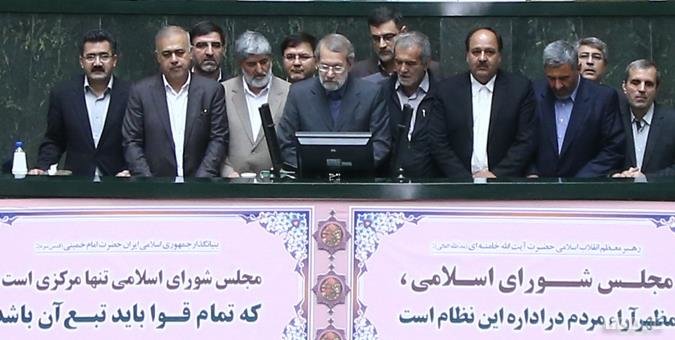Majlis decides on presiding board

TEHRAN – Masoud Pezeshkian, a reform-minded lawmaker from Tabriz, and Ali Motahari, a vocal and yet moderate principlist MP representing Tehran, were elected respectively as first and second deputy parliament speakers on Tuesday.
Out of the 273 votes cast, Pezeshkian secured 158 votes and Motahari 133.
Motahari garnered the highest number of votes in the Feb. 26 parliamentary election in the 30-member candidate list in Tehran led by reformist Mohammad Reza Aref.
In the voting, as expected, Ali Larijani was also reelected as the speaker of the new parliament, gaining 237 votes out of 276.
Mostapha Kavakebian who secured a seat in the Majlis from the Tehran constituency ran for the post of speaker, but he just won 11 votes.
28 MPs abstained in the voting.
It was the highest number of votes that a parliament speaker had succeeded to win since the history of the Islamic Revolution.
The voting for the Majlis presiding board is held every year.
Aref, the leader of “Hope” faction in the new parliament, refused to field candidacy for the speakership post after he just got 103 votes for the interim parliament speaker on Saturday.
In the voting for the interim parliament on Saturday Larijani won 173 votes out of 281.
Larijani held the post of speaker for two consecutive terms, from 2008 to 20016, when the principlists dominated the parliament.
During the vote for presiding board, Hamidreza Hajbabayee, a representative from Hamadan, and MP Mohammad Dehqan from Cheneran and Tarqabeh, failed to gain enough votes for deputy speakers, gaining 123 and 118 votes respectively. The two MPs were from the principlist camp.
Accordingly, Gholamreza Kateb, Amir-Hossein Ghazizadeh Hashemi, Akbar Ranjbarzadeh and Ahmad Amir-Abadi Farahani from the Majlis principlist faction, along with Ali Asghar Yousefnejad and Mohammad Ali Vakili from the Hope faction were among other candidates who were elected as the secretaries of the presiding board.
Also, Mohammad Ashouri Taziani and Behrouz Namati, MPs from the principlist faction, and Mohammad Qasim Osmani, a member of the Hope faction, were elected as supervisors of the presiding board.
Popularity among both factions
Larijani, a moderate principlist politician, has gained backing both among moderate principlists and moderate reformists as he managed a parliamentary of ratification of the nuclear deal Iran clinched with great powers in July 2015.
Larijani has also expressed his support for the government’s economic policies, saying that Majlis should help the government to recover the sluggish economy.
In addition to managing the Majlis for eight years, Larijani also served as the secretary of the Supreme National Security Council from 2005 to 2007 when Mahmoud Ahmadinejad was president. At the time the SNSC was tasked with negotiating with the West over the nuclear issue, and thereby Larijani held several rounds of talks with Javier Solana, who at the time was the European Union’s chief diplomat.
He also served as culture minister under the presidency of Akbar Hashemi Rafsanjani from 1993 to 1997.
Larijani was also head of the national TV, IRIB, for ten years.
PA/AK

Leave a Comment